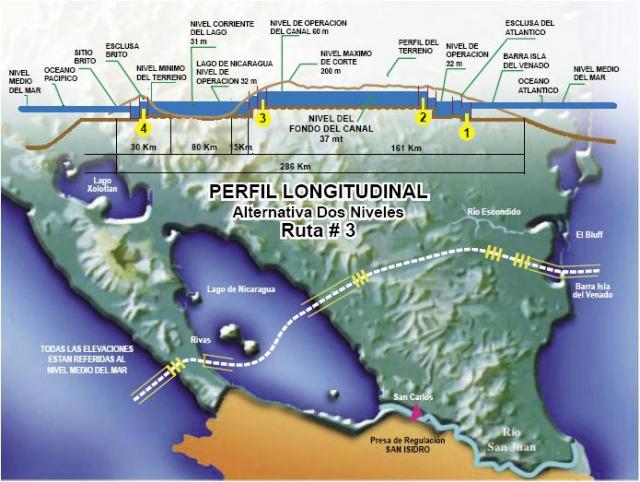Here is a proposed route for the canal to be built in Nicaragua if it is built. Recent events have lead many to believe that it could become a reality. The company chosen to do the feasibility is China Railway Construction Corp . CRCC is one of the largest integrated construction companies in China by revenue. The company, which has a market share of approximately 50% in railway construction, has participated in the construction of some of China’s most important and landmark railway projects. It is also the sixth largest contractor in the World. It helps that it is 100% owned by the Nation of China. This has huge implications for the project that was thought to be a long shot and touted as a project to be undertaken by numerous countries including Russia. Here is the story.
A Chinese state heavyweight is the company contracted to carry out the feasibility study for the Grand Canal of Nicaragua.
This is good news for Nicaragua: peaking out from behind the unknown HK Nicaragua Canal Development and its president Wang Jing, are the real stakeholders in the Grand Oceanic Canal.
According to an article in Elnuevodiario.com.ni China Railway Construction Corp., CRCC, is “… the second largest state-owned property in China, and the sixth largest construction contractor in the world, and which will work in Nicaragua, even though HKDN Group has stated that the Chinese Government is not bound directly to the project. ”
The good rating given by Moody’s to CRCC is based on the support that it has from the Chinese state, as it is “100% owned by the Government of China”, as well as “its dominant position in the market, its track record of over 60 years , strong operational capabilities and reasonably strong financial profile. ”
According to Fortune Magazine the company China Railway Construction Corp in 2010 ranked in position 133 out of the “top 500 in the world” .
Source: elnuevodiario.com.ni
Here is an editorial that I saw that is very well written and to the point about the impact of China here and around the world.
Editorial
By Jorge Cobas
As a commercial project, the Inter-Oceanic Canal in Nicaragua is economically unfeasible, in particular because the uncertainty over the return on investment to be made is so large. But for a country destined to be a world leader, as is China, for whom finance of $40 billion is no small thing, possession of a dominion over a waterway in the backyard of its greatest commercial competitor makes this investment a bargain.
President Obama conducted a routine visit to Central America in his second presidential term, and the most important thing he left behind was stories about the menus at the formal dinners. In contrast, Chinese President Xi Jinping left hundreds of millions of dollars in loans for projects, which are, of course, well tied to the convenience of Chinese companies.
Xi Jinping did not visit Nicaragua. However, it could become the most important country for China on the American continent, in this century and the next.
Nicaragua is, under its current institutional conditions, with a Sandinista government which rules with the factual and dubiously democratic style of leftist Latin American governments – often going above the heads of opposing minorities – the Central American country where it is possible to develop this brilliant geopolitical Chinese operation.
Clearly, franchising the Inter-oceanic Canal directly to the Chinese state would have been much resisted and even unfeasible in political terms, both inside and outside of Nicaragua. As we have seen, the government of President Ortega found no obstacle to giving ownership of this concession to a nearly non-existent company. However, given the style of Chinese developmental policy, it is highly unlikely that the company will not be dependent on a government that has a clear need to ensure mastery of global sea routes, not only in terms of trade but also of military strategy.
It is clear that the construction of the Inter-oceanic Canal – if realized – would revolutionize and boost the economy of Nicaragua, to the well deserved benefit of its inhabitants, but it could also convert the country – and region – into a focus for geopolitical tensions, with unpredictable consequences.
What is absolutely certain is that we should hurry up and learn Chinese
